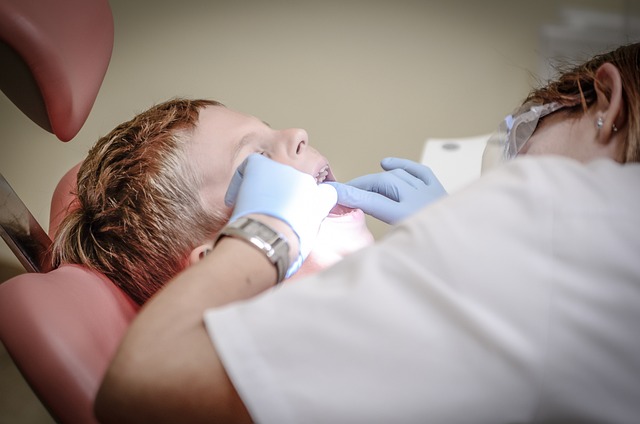Considering veneers to address missing teeth? Read on to discover if veneers are a suitable solution for your dental needs.
1. Understanding Veneers: A Solution for Missing Teeth in Dentistry
Veneers are a popular and effective solution for missing teeth in modern dentistry. They are thin, custom-made shells made from tooth-colored materials that are bonded to the front surface of the teeth. Veneers are specially designed to match the color, shape, and size of your existing teeth, resulting in a natural-looking and seamless smile.
There are several benefits of opting for veneers to address missing teeth:
- Improved aesthetics: Veneers can greatly enhance the appearance of your teeth. They can cover up gaps, stains, chips, and misalignments, giving you the perfect smile you’ve always wanted.
- Durable and long-lasting: Veneers are made from high-quality materials that are resistant to staining and wear. With proper care and maintenance, they can last for many years.
- Minimally invasive procedure: Getting veneers is a minimally invasive process compared to other treatments. The dentist will remove a small amount of enamel from the teeth to ensure a proper fit, but this is typically a painless procedure.
- Quick and efficient: The process of getting veneers usually requires just a few visits to the dentist. Once your custom veneers are ready, they can be bonded to your teeth in a single appointment.
If you have missing teeth and are looking for a reliable and natural-looking solution, veneers may be the ideal choice for you. Consult with your dentist to determine if veneers are a suitable option, and discover the transformative effects they can have on your smile and overall confidence.
2. Exploring the Possibility of Veneers in Cases of Missing Teeth
Veneers are a popular cosmetic dental solution that can also be explored in cases where a patient has missing teeth. They offer a versatile and effective option for those looking to improve the appearance of their smile. Here’s what you need to know about veneers in such cases:
1. Aesthetic Solution: Veneers can be used to enhance the appearance of a smile affected by missing teeth. By covering the front surface of the teeth, veneers can provide a natural, even look, filling the gaps left by missing teeth. They are custom-made to match the color and shape of adjacent teeth, ensuring a seamless and attractive result.
2. Avoiding Orthodontic Treatments: Veneers can be a viable alternative to orthodontic treatments such as dental implants or braces in cases of missing teeth. While these treatments focus on replacing the missing tooth or moving surrounding teeth, veneers can achieve a similar effect by creating the illusion of full teeth. This can be especially beneficial for those who wish to avoid lengthy treatment times or invasive procedures.
In today’s modern dental industry, veneers have become popular as a versatile solution for addressing missing teeth concerns. Designed to bridge the gap between missing teeth, veneers offer a natural-looking and affordable option for restoring a confident smile. Whether caused by trauma, decay, or genetics, missing teeth can create functional and aesthetic challenges for individuals. Fortunately, veneers can effectively resolve these issues and provide a durable and long-lasting solution. One of the key benefits of veneers is their ability to mimic the appearance of natural teeth. Created from thin ceramic shells, these custom-made coverings are expertly shaped and shaded to match the surrounding teeth perfectly. This ensures a seamless integration and harmonious smile. Additionally, veneers are stain-resistant, allowing individuals to enjoy a bright and white smile without the worry of discoloration. Veneers can also provide added support to adjacent teeth, preventing potential shifting or misalignment. The procedure itself is minimally invasive, with little to no discomfort experienced by patients. With proper care and Veneers can be an excellent solution for individuals with missing teeth, providing both aesthetic and functional benefits. Here are some key factors to consider when evaluating veneers as a viable option: Before considering veneers, it’s important to consult with a qualified cosmetic dentist who can evaluate your specific situation and determine if you are a suitable candidate. They will be able to address any concerns or questions you may have, provide personalized recommendations, and guide you through the process to achieve the best possible outcome. Veneers are a revolutionary solution for individuals with missing teeth, transforming their smiles and boosting their self-confidence. These thin, custom-made shells are made from One of the primary advantages of veneers is their versatility in addressing a variety of dental conditions, including missing teeth. By affixing veneers to adjacent teeth, a skilled dentist can effectively close gaps caused by missing teeth, creating a harmonious smile. Additionally, veneers can also restore the functionality lost due to missing teeth, enabling individuals to eat, speak, and chew comfortably. Moreover, veneers provide a long-lasting solution, as they are highly resistant to staining, discoloration, and chipping. Veneers and missing teeth are common dental concerns that many people have questions about. However, there are numerous myths surrounding these topics that can lead to confusion and misinformation. In this section, we will debunk some of the most prevalent myths and separate the facts from fiction. Myth 1: Veneers are only used for cosmetic purposes. Myth 2: Missing teeth do not require replacement if they are not visible.4. Evaluating Veneers as a Viable Option for Individuals with Missing Teeth
5. Unveiling the Potential: Veneers and their Impact on Smiles with Missing Teeth
6. Debunking Myths: Separating Facts from Fiction about Veneers and Missing Teeth
7. Considering Veneers: Examining the Pros and Cons for Those with Missing Teeth
Veneers are a popular option for people who have missing teeth. They are thin, custom-made shells that are bonded to the front surface of teeth, enhancing their appearance and restoring confidence in one’s smile. However, before making a decision, it’s important to examine the pros and cons of veneers:
Pros:
- Natural appearance: Veneers are designed to blend seamlessly with surrounding teeth, creating a natural and aesthetically pleasing smile.
- Durable: Made from strong materials such as porcelain or composite resin, veneers are resistant to stains and decay, providing long-lasting results.
- Immediate results: Unlike some other dental procedures, veneers require minimal preparation and can be placed in just a few visits to the dentist, instantly transforming your smile.
Cons:
- Irreversible process: The process of getting veneers involves removing a small amount of enamel from the teeth, which is irreversible. Therefore, it’s crucial to carefully weigh the decision.
- Potential sensitivity: Some individuals may experience temporary tooth sensitivity after getting veneers, especially to hot or cold temperatures. This sensitivity usually subsides over time.
- Cost: Veneers can be quite expensive, and they may not be covered by dental insurance. It’s important to consider your budget and explore alternative options as well.
8. Expert Insights into Veneers: Can they Really Work on Missing Teeth?
When it comes to addressing missing teeth, veneers have become a popular consideration for many individuals. Veneers are thin shells made of porcelain or composite resin that are custom-made to fit over the front surface of teeth. While veneers are primarily used to improve the appearance of teeth by correcting issues such as discoloration, chips, or gaps, they may not be the best solution for addressing missing teeth. Here’s why:
- Functionality: Veneers are designed to enhance the aesthetics of your smile, rather than restore the function of your teeth. They are bonded to the existing tooth structure and do not replace missing teeth.
- Bite alignment: Missing teeth can cause misalignment in your bite, affecting your ability to chew properly. Veneers cannot correct this issue as they are not designed to support the pressure and forces involved in biting and chewing.
- Bone preservation: When a tooth is lost, the underlying bone can begin to deteriorate over time. Veneers do not provide the necessary support to prevent this bone loss, which can lead to further complications down the line.
While veneers can work wonders for enhancing your smile and addressing certain dental concerns, it is important to consult with a dental professional to explore alternative options if you have missing teeth. Dental implants, bridges, or dentures are commonly recommended solutions that prioritize functionality and address the underlying issues associated with tooth loss. By understanding the limitations of veneers and exploring appropriate alternatives, you can make an informed decision that best suits your specific dental needs.
9. The Art of Smile Restoration: Veneers as a Comprehensive Solution for Missing Teeth
When it comes to restoring a smile that has missing teeth, veneers have emerged as a remarkable comprehensive solution that provides both aesthetic and functional benefits. Veneers are thin, custom-made shells made from tooth-colored materials, such as porcelain or resin, that are designed to cover the front surface of teeth. This versatile dental treatment can effectively address a range of dental issues, including missing teeth, gaps, discoloration, and misalignment.
Veneers offer numerous advantages when it comes to smile restoration. First and foremost, they provide a natural-looking result that seamlessly blends with the rest of your teeth, creating a uniform appearance. Additionally, veneers are a minimally invasive procedure, requiring only a small portion of the tooth’s enamel to be removed. This means that the overall health and structure of your teeth are preserved. Furthermore, veneers are highly durable and resistant to stains, making them a long-lasting solution for missing teeth. Whether you are missing a single tooth or multiple teeth, veneers can be customized to match the size, shape, and color of your existing teeth, resulting in a stunning smile transformation that boosts your confidence and improves your overall oral health.
10. Empowering Smiles: How Veneers can Transform Appearance despite Missing Teeth
In the world of dentistry, veneers have become a popular solution for transforming appearances despite missing teeth. These thin, custom-made shells made from tooth-colored materials are placed over the front surface of teeth to improve their appearance. One of the key benefits of veneers is that they can help conceal gaps caused by missing teeth, giving individuals the confidence to smile again.
Achieving a perfect smile no longer seems like an impossible dream, thanks to veneers. Not only do they hide the gaps left by missing teeth, but veneers also have the power to enhance the overall appearance of teeth. Their natural look and feel make them virtually unnoticeable, and they can be custom-made to match the color and shape of the existing teeth. With veneers, you can achieve a brighter, straighter, and more uniform smile, boosting your self-esteem and transforming the way you look.
Conclusion
In conclusion, veneers can be a great solution for improving your smile even with missing teeth. By working closely with your dentist, they can create a treatment plan that addresses both the missing teeth and veneers to give you the best results. Remember, it’s important to have a thorough evaluation and discuss all your options before making a decision. Your dentist is your best resource for guidance and ensuring the success of your dental journey.





